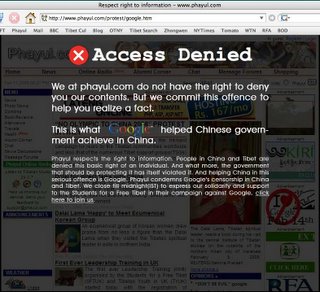Internet censorship: Google, China and the rest of us!
Google’s submission to Chinese censorship rules is perhaps more significant than Yahoo, or Microsoft’s submission, mainly because Google has, over the years, become ubiquitous to search. More importantly, Google’s submission invites concern because many people see Google to be this ultimate poster boy of free speech – irrespective of whether they are aware of Google’s official policy of ‘don’t be evil’.
Google has responded to large-scale media criticism by saying, that this move will eventually expand access. At their Official Blog they say “Filtering our search results clearly compromises our mission. Failing to offer Google search at all to a fifth of the world's population, however, does so far more severely.”
So what are they censoring? Information about Tibet, Taiwan, and anything deemed anti-government or "politically sensitive". According to CNET, this includes Falun gong, teen pregnancy, homosexuality, beer, and jokes. Some of the sites banned by Google (according to CNET): are:
bignews.org
chinesenewsweek.com
falunasia.info
faluncanada.net
hrw.org
libertytimes.com.tw
news.bbc.co.uk
omnitalk.com
pressfreedom.com
savetibet.org
voa.gov
 Not all sites have been banned – a search at Google.cn for Tibet or the Dalai Lama, for instance, does throw up some ‘dissident’ or politically sensitive sites. One such Tibetan web site Phayul decided to ban itself and draw attention to the issue.
Not all sites have been banned – a search at Google.cn for Tibet or the Dalai Lama, for instance, does throw up some ‘dissident’ or politically sensitive sites. One such Tibetan web site Phayul decided to ban itself and draw attention to the issue.A nice post at Boing Boing points out that “Nowhere is Google's evil more keenly felt than in Dharamsala. It is home to the Dalai Lama and thousands of Tibetans who fled here after China invaded their country in 1949. Now, thanks to Google, any Chinese who wants to get information about the Dalai Lama, human rights, or Tibet will only get criticisms, official government policy, and lies, respectively. For Tibetans this isn't just a censorship issue. It's an extension of China's de facto practice of cultural genocide into cyberspace, and Google is part of that.”
There is large-scale public protest and outcry, and rightly so, but fortunately even Google cannot censor the web, even if it wished to. Paul Boutin points out at his blog that if you search for Tiananmen at google.cn you only find beautiful touristy images. However, if you misspell it as Tianenmen, Tienanmen or Tiananman you can find the tanks. CNET also points out that “The University of Pennsylvania's entire engineering school server--which hosted one Falun Gong site--was blocked from Google's Google.cn China site. So was an Essex County Web site, which sports the word "sex"--as in "Essex"--in its domain name.”
Human rights group Reporters Without Borders (RSF) says that Yahoo provided electronic records of its customer and cyberdissident Li Zhi which led to led to an eight-year prison sentence in December 2003. That was not an isolated case. RSF quotes that case of “Shi Tao, who was jailed for 10 years last April on the basis of Yahoo-supplied data” and suggests that “Yahoo works regularly and efficiently with the Chinese police.” http://www.rsf.org/article.php3?id_article=16402
Reporters Without Borders maintains an eye-opening ‘Press Freedom Barometer’, according to which 2006 has seen 5 Journalists and 3 media assistants killed, 118 Journalists, 3 Media assistants and 58 Cyberdissidents imprisoned. While China leads the pack, it is not the only country prosecuting free speech and dissent.
Here is the list of journalists imprisoned by some countries:
• China (32)
• Cuba (24)
• Ethiopia (17)
• Eritrea (13)
• Burma (5)
• Uzbekistan (4)
• Iran (3)
• Maldives (3)
• Rwanda (3)
• Algeria (2)
• Israel (1)
• Egypt (1)
• Iraq (1)
• Laos (1)
• Libya (1)
• Nepal (1)
• Nigeria (1)
• North Korea (1)
• Tunisia (1)
• Turkey (1)
• Turkmenistan (1)
• United States (1)
It is heartening to see that India does not figure on this list. Over the past few years, India has had a few misadventures with censorship, reportedly related to terrorism and national security! The most recent one involved Google (Google Earth to be precise) once again, and fortunately, in that instance Google did not take any action.
Google does not always comply. Google is denying the US Federal prosecutors’ request for handing over a random sampling of one million search queries submitted by users over a one-week period. The US Federal prosecutors have asked Google, Microsoft, Yahoo and America Online for this information in order to defend a controversial 1998 Child Online Protection Act, related to Internet pornography.
That, to my mind, is the only special case – safety of children online – where there is a pressing need to exercise some access control, which appears to be different from censorship. Most societies deny or restrict children’s access to bars, adult stores, automobiles... not all restaurants and stores but only bars and adult stores; not automobiles per se but the driving of automobiles. Adult supervision along with some form of legislation works well in most societies. Controlling and restricting children’s access through supervision and technology along with some form of legislation should work on the net too.
The equation is very simple: even though many people seem to be getting it wrong -- children can be protected by restricting access. Adults can be protected by freeing up access.
-- Ajay Jaiman

0 Comments:
Post a Comment
<< Home